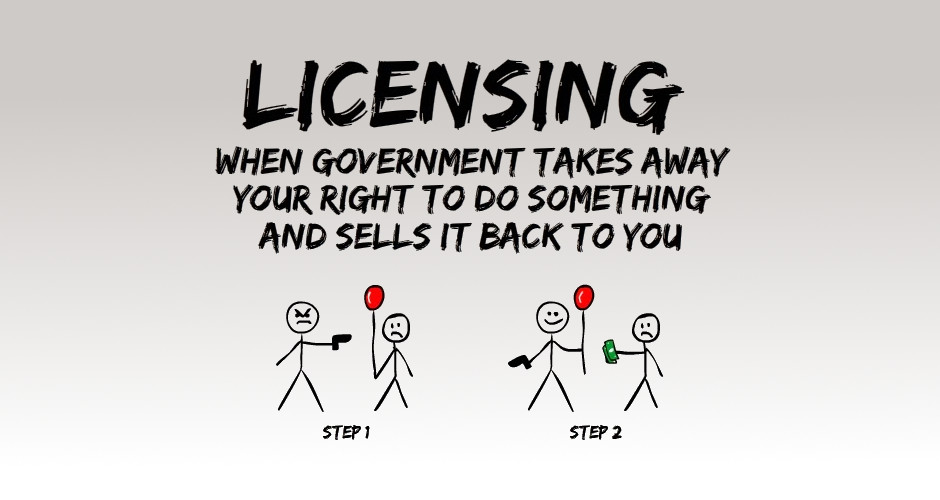The most basic right of every individual is the right to be left alone so long as the individual is not infringing on the equal and equivalent rights of others to do the same. Peaceful people shouldn’t face state aggression simply because they attempt to engage in voluntary transactions among themselves.
It has been said “a license is just the state selling you back a limited slice of the freedom it has stolen from you,” and this observation is essentially true. Virtually every action which now requires a license was once done without a license—from driving a car to cutting hair to giving a massage—and despite the lack of licensure, life went on much the same as it does today.
The state likes to claim that it steals your freedoms and sells them back to you in the interest of “public health” and “public safety,” but the reality has much more to do with enlarging the size and scope of government and with enriching bureaucrats and politicians than with protecting individuals or the much-vaunted “public” from any real threats.
The other nefarious purpose behind occupational licensure is established businesses using the state to erect barriers to entry against potential competitors. This process is defined as “regulatory capture” because the special interest groups and lobbyists which represent the entrenched players in an industry have in essence ‘captured’ control of the regulatory agency. This is why we often hear legislators declaring that ‘the industry’ is in favor of a new licensure mandate. The existing businesses are typically grandfathered in during the creation of the agency while any potential new businesses will find themselves with often insurmountable obstacles erected in their path.
Even setting aside the disreputable purposes and the abrogation of individual liberty, the supposed ‘logic’ behind requiring occupational licenses is quite flawed. The natural corollary to the presumption of innocence—the idea that everyone is considered innocent until proven guilty—is the presumption of competence. If someone claims that they are able to do something (indicated by the fact they have undertaken the action), it is incumbent upon the state to presume that they are competent (i.e. innocent of lying or engaging in fraud) unless they are proven to be incompetent.
Even in its purest and most uncorrupted form, requiring a license to engage in an action is a demand that competence be proven prior to the action being undertaken. It is the presumption of incompetence imposed under threat of sanction and incarceration against any who would prove their merit through action rather than through testing and paying exorbitant fees.
It is not as if the state is the only entity which can provide useful information to consumers regarding the skills and competence of professionals. There are many private-sector businesses and organizations which exist for precisely this purpose. Just a few examples are the Better Business Bureau, Yelp, and Angie’s List. Even if the state did not mandate licensing for any businesses or professions, there would still be accountability and methods to identify the best providers and to avoid those who were inept or duplicitous.
Idaho may not be the most onerous state when it comes to occupational licensing, but it is getting more and more burdensome every year. As of 2017, the Idaho Bureau of Occupational Licenses (IBOL) regulates more than fifty professions including barbers, cosmeticians, driving teachers, and massage therapists. Licenses can cost as much as $1,000 per year for some occupations and the mandated schooling can require years of expensive training—even for individuals who are already providing their services to satisfied clients!
Under Idaho law, barbers must receive at least 900 hours of training in an approved school, massage therapists must receive 500 hours, and cosmeticians need a whopping 2,000 hours of education in order to obtain a license. Once again, we see an overarching presumption of incompetence coupled with the desire of entrenched businesses to limit competition and of established schools to guarantee themselves students.
The right to be left alone, the right to earn a living, the right of individuals to engage in voluntary transactions, and even the right to free speech—all are significantly violated by occupational licensing requirements. Yes, even publicly announcing one’s competence to carry out a particular action has been outlawed unless the state is first paid for the privilege to use certain words and phrases.
Consider this language from the statute regulating massage therapists: “It shall be unlawful for any person who is not a licensed massage therapist under this chapter to advertise using the term ‘massage therapist.'” The law further infringes upon free speech by claiming that “a person holds himself or herself out to others as a massage therapist when the person adopts or uses any title or description including ‘massage therapist,’ ‘massagist,’ ‘massotherapist,’ ‘myotherapist,’ ‘body therapist,’ ‘massage technician,’ ‘massage practitioner’ or any derivation of those terms that implies this practice.”
The law quite literally makes it a crime to use certain words when describing one’s own abilities. Why is the state so afraid of people talking about their skills and engaging in voluntary transactions with other willing parties? Could it be that the state does not want people to realize how superfluous and even harmful its regulations are to their daily lives?
Occupational licenses are enacted under a pretext of protecting “public health” and “public safety,” while the real reasons are growing government and protecting established businesses from competition. No one who truly believes in individual liberty and a small and limited government should ever support the state stealing people’s freedom and selling it back to them. It’s time (past time, really) for the Idaho Legislature to start repealing occupational licensing mandates rather than passing more of them.


